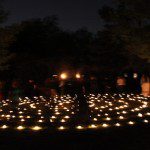The old goddesses and gods are, for the most part, not jealous gods. As long as they get their just due, they don’t much care if you work with or for other deities. That makes sense if you think polytheistically: while our gods and goddesses are far more powerful than we are, they are not omniscient, omnipresent, or omni-anything. Their limited capacities mean they only have so much time to listen to you.
Though I am pledged first to Cernunnos and secondly to Danu, and though I honor them in my nightly prayers, for the past many months I’ve mainly been working with and for others: Morrigan, Brighid, and most recently the Neteru of Egypt. But earlier this year I began to hear Cernunnos calling to me again. His call was calm and patient but also clear and firm: “finish this work, but after Summer Solstice I need you.”
Summer Solstice is over. When we set our calendar back in December I volunteered to lead the Lughnasadh circle. Obviously, Lughnasadh will be a circle dedicated to Cernunnos. But what kind of circle should it be? Simply plugging Cernunnos into our standard liturgy doesn’t seem to be enough.
One of the primary duties of a priest or priestess is presenting the gods to the people. In ancient times that wasn’t necessary – people knew who their gods were. In our time, an average person may recognize the names of the better-known Greek and Roman deities, but odds are good they can’t tell you anything beyond “Aphrodite is the Goddess of Love” and “Ares is the God of War.” Cur-no-who? Never heard of him.
One of the best ways to introduce gods and goddesses to people is to tell their stories. At Imbolc we told the story of Brighid the Inspirer, Brighid the Transformer, and Brighid the Healer. At Beltane we told the story of Morrigan and her dealings with Dagda and with Cú Chulainn. At Summer Solstice we told the story of how Horus defeated Set, with the aid of his mother Isis.
There are no ancient stories of Cernunnos. There is only one (possibly two) records of his name. We don’t know if the iconography attributed to him (including the image from the Gundestrup Cauldron I wear on a pendant) is properly his, although it seems likely. Though he is considered a Celtic deity (an assumption I consider likely, both from objective evidence and from my own experiences), Cernunnos seems to have more in common with the figures of cave paintings than with the Tuatha De Danann.
There are, however, modern stories of Cernunnos. I’ve been re-reading Hoofprints in the Wildwood, a collection of stories, poems and artwork dedicated to the Horned Gods, many of them specifically dedicated to Cernunnos. But even the best of these stories (Juniper’s “My God” remains my favorite) aren’t really suitable for ritual presentation.
Last week I spent some time contemplating all this. I read some from Hoofprints, went outside with a glass of wine, poured some of it as a libation, then sat down to sip the rest. It was hot – just on the cusp of the kind of heat that makes being outside miserable. But the setting Sun was to my back, and the low rays created a beautiful vision of the trees, hedges and vines in the back yard. Lines from Hoofprints were dancing in my head, bouncing off my own experiences of Cernunnos and my ideas about rituals. I kept waiting – and hoping – for Him to break through and tell me what he wanted.
Instead, a young rabbit appeared on the patio. He/she sniffed around, saw me, and stopped. I expected the rabbit to run off, but she/he came closer and closer, getting within an arm’s length. I remained still. And quiet. The rabbit looked at me again, then hopped into the yard and started nibbling grass.
Some things can’t be explained – they can only be experienced.
Telling their stories is one way to present the gods to the people. Another way is to invoke the gods, to reverently invite them into the circle and ask them to touch those in attendance.
We do invocations all the time, at every ritual and in my own nightly prayers. But it’s one thing to invite a god or goddess to be your honored guest, to accept your offerings and sacrifices, and to bless your life and your work. It’s another thing to say “here we are – speak to us.” You don’t know what He’s going to do. You don’t know how everyone will respond. You don’t know who might not be ready to hear and see what will be seen and heard.
For someone who likes order, that’s a scary proposition.
But it’s become clear that’s what He wants.
So that’s what we’re going to do. I have a month to get ready, to come up with just the right combination of preparation, presentation, and invocation. I need to do more reading, more meditation, and more contemplation.
Because in the wonderful words of S.J. Tucker, we best be ready when the Horned God comes.













